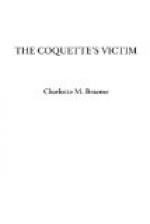Jules St. Croix, Count of the French Empire, charged the prisoner at the bar with having broken into his rooms for the purpose of robbery. He had been discovered in the count’s drawing-room, where he had forced open an ivory casket and stolen the contents, which were an ancient and valuable gold watch and a gold ring, also of considerable value. At the moment that the count, followed by his servant, entered the room, the prisoner had these articles in his hand. He dropped them immediately, but the count, hastily calling for the police, gave him in charge.
There was a smell of burned paper in the room and it was nearly eleven at night.
The magistrate asked if the prisoner had made any resistance. Policeman C. No. 14, answered, “No, he gave in at once; and came straight away.”
Mr. Kent asked again: “Was there anything in the casket beside the jewelry?”
It seemed to be a very insignificant question, but the prisoner and the count looked steadfastly at each other and both answered: “No.”
There were two witnesses. Robert Bolton, the count’s servant, and C. No. 14, the policeman. The evidence of the servant was taken first. He said that the prisoner had called several times to see his master, always coming when the count was from home; that he had, before, made one or two efforts to get into the count’s room, but that he, the servant, had always refused him permission.
On this evening the count went out early, and Robert Bolton having some errands to do, followed his master. About ten o’clock the prisoner called at the house, No. 24 Cambridge Terrace, and asked to speak to Count St. Croix. The landlady of the house told him the count was from home; then the prisoner said:
“I know. I will go to his room and wait there for him.”
The landlady, believing him to be a perfect gentleman, allowed him to go up to the count’s room. Robert Bolton returned home just as his master was at the door; when the landlady told him a gentleman was waiting there, it flashed instantly into his mind there was something wrong. He hastily told his suspicions to the count and they ran upstairs together. Opening the door quickly, they found the prisoner with the casket in one hand and the watch in the other. There was an odor of burnt paper in the room.
The count immediately opened the window and called for the police. C. No. 14 was just passing, and in marvelously quick time he ran upstairs.
“This man has gotten into my room on false pretences,” said the count. “He is a stranger to me. I give him in charge for breaking open my casket and stealing a watch and ring from it.”
“What did the prisoner say.”
“He pointed to the watch and ring, and said: ‘There they are;’ then he looked at the count with a smile.”
“Did he seem frightened?”
“Not the least in the world,” was the answer; “just the contrary.”




